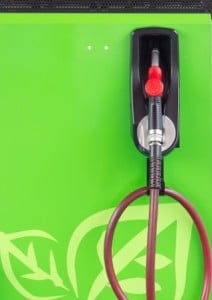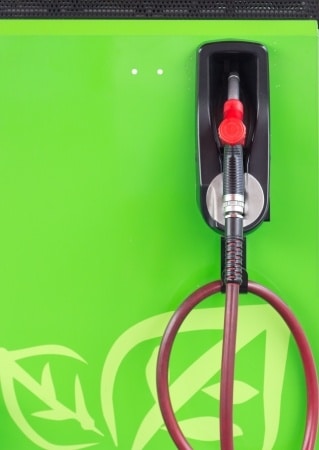 It sounds a bit like alchemy, but making gas from garbage is actually possible. At a recent speaking engagement, PK Clean founders Priyanka Bakaya and Ben Coates said they have a process that produces oil more efficiently while helping to reduce the environmental impact of plastic waste around the world.
So how does it work? Ground-up plastic is burned until it evaporates and condenses into a usable product: 70 to 80 percent into oil, 10 to 20 percent into natural gas. The natural gas is recycled back into the system, and the small remaining percentage is “char” waste from dirt or residue on the plastic.
Bakaya said the process can convert 20,000 pounds of non-recycled plastic into 60 barrels of oil per day, with zero emissions.
The idea is still vying for mainstream acceptance, said John Bordynuik, another manufacturer profiled in a recent NPR story. Bordynuik blames the “alternative” and “green fuel” labels being applied to the process and the fact that previous attempts have resulted in less-than-optimum products.
According to the Environmental Protection Agency, only about 7 percent of plastic waste is recycled in the U.S., with the rest going to landfills. If all suitable non-recycled plastic waste were converted, it would make 10 billion gallons of oil – the equivalent of a quarter of all automobile fuel used in the United States – each year.
It sounds a bit like alchemy, but making gas from garbage is actually possible. At a recent speaking engagement, PK Clean founders Priyanka Bakaya and Ben Coates said they have a process that produces oil more efficiently while helping to reduce the environmental impact of plastic waste around the world.
So how does it work? Ground-up plastic is burned until it evaporates and condenses into a usable product: 70 to 80 percent into oil, 10 to 20 percent into natural gas. The natural gas is recycled back into the system, and the small remaining percentage is “char” waste from dirt or residue on the plastic.
Bakaya said the process can convert 20,000 pounds of non-recycled plastic into 60 barrels of oil per day, with zero emissions.
The idea is still vying for mainstream acceptance, said John Bordynuik, another manufacturer profiled in a recent NPR story. Bordynuik blames the “alternative” and “green fuel” labels being applied to the process and the fact that previous attempts have resulted in less-than-optimum products.
According to the Environmental Protection Agency, only about 7 percent of plastic waste is recycled in the U.S., with the rest going to landfills. If all suitable non-recycled plastic waste were converted, it would make 10 billion gallons of oil – the equivalent of a quarter of all automobile fuel used in the United States – each year. 
Making gas from garbage
 It sounds a bit like alchemy, but making gas from garbage is actually possible. At a recent speaking engagement, PK Clean founders Priyanka Bakaya and Ben Coates said they have a process that produces oil more efficiently while helping to reduce the environmental impact of plastic waste around the world.
So how does it work? Ground-up plastic is burned until it evaporates and condenses into a usable product: 70 to 80 percent into oil, 10 to 20 percent into natural gas. The natural gas is recycled back into the system, and the small remaining percentage is “char” waste from dirt or residue on the plastic.
Bakaya said the process can convert 20,000 pounds of non-recycled plastic into 60 barrels of oil per day, with zero emissions.
The idea is still vying for mainstream acceptance, said John Bordynuik, another manufacturer profiled in a recent NPR story. Bordynuik blames the “alternative” and “green fuel” labels being applied to the process and the fact that previous attempts have resulted in less-than-optimum products.
According to the Environmental Protection Agency, only about 7 percent of plastic waste is recycled in the U.S., with the rest going to landfills. If all suitable non-recycled plastic waste were converted, it would make 10 billion gallons of oil – the equivalent of a quarter of all automobile fuel used in the United States – each year.
It sounds a bit like alchemy, but making gas from garbage is actually possible. At a recent speaking engagement, PK Clean founders Priyanka Bakaya and Ben Coates said they have a process that produces oil more efficiently while helping to reduce the environmental impact of plastic waste around the world.
So how does it work? Ground-up plastic is burned until it evaporates and condenses into a usable product: 70 to 80 percent into oil, 10 to 20 percent into natural gas. The natural gas is recycled back into the system, and the small remaining percentage is “char” waste from dirt or residue on the plastic.
Bakaya said the process can convert 20,000 pounds of non-recycled plastic into 60 barrels of oil per day, with zero emissions.
The idea is still vying for mainstream acceptance, said John Bordynuik, another manufacturer profiled in a recent NPR story. Bordynuik blames the “alternative” and “green fuel” labels being applied to the process and the fact that previous attempts have resulted in less-than-optimum products.
According to the Environmental Protection Agency, only about 7 percent of plastic waste is recycled in the U.S., with the rest going to landfills. If all suitable non-recycled plastic waste were converted, it would make 10 billion gallons of oil – the equivalent of a quarter of all automobile fuel used in the United States – each year. 

